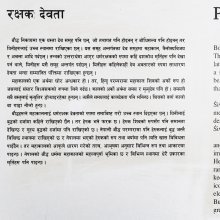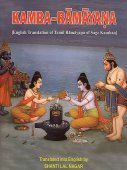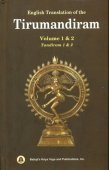Tarana, Tāraṇa, Taraṇa, Tarāna: 28 definitions
Introduction:
Tarana means something in Buddhism, Pali, Hinduism, Sanskrit, the history of ancient India, Marathi, Jainism, Prakrit, Hindi, biology, Tamil. If you want to know the exact meaning, history, etymology or English translation of this term then check out the descriptions on this page. Add your comment or reference to a book if you want to contribute to this summary article.
Images (photo gallery)
In Hinduism
Jyotisha (astronomy and astrology)
Source: Wisdom Library: Brihat Samhita by VarahamihiraTāraṇa (तारण) refers to the eighteenth of the sixty-year cycle of Jupiter, according to the Bṛhatsaṃhitā (chapter 8), an encyclopedic Sanskrit work written by Varāhamihira mainly focusing on the science of ancient Indian astronomy astronomy (Jyotiṣa).—Accordingly, “The first year of the fourth yuga is known as Citrabhānu; in it mankind will be happy. The second is known as Subhānu. In it mankind will be neither happy nor miserable; there will however be disease in the land but no deaths in consequence. The next year is known as Tāraṇa; in it there will be abundance of rain. The next is known as Pārthiva; in it crops with thrive well and mankind will be happy. The fifth year is known as Vyaya; in it amorous sensastions will prevail over the land”.
Source: The effect of Samvatsaras: SatvargasTāraṇa (तारण) refers to the eighteenth saṃvatsara (“jovian year)” in Vedic astrology.—If there is birth in the ‘samvatsara’ of ‘tarana’, the native is deceitful or cunning but is valiant (warrior or champion) or heroic, restless, well versed (skilled) in arts and crafts, extremely harsh and cruel, doer of those things which are the object of hatred, consumer of those things which are obtained by him and is endowed with wealth.
According with Jataka Parijata, the person born in the year tarana (2004-2005 AD) will possess exceeding wealth and strength and will be a philosopher.

Jyotisha (ज्योतिष, jyotiṣa or jyotish) refers to ‘astronomy’ or “Vedic astrology” and represents the fifth of the six Vedangas (additional sciences to be studied along with the Vedas). Jyotisha concerns itself with the study and prediction of the movements of celestial bodies, in order to calculate the auspicious time for rituals and ceremonies.
Vaishnavism (Vaishava dharma)
Source: Pure Bhakti: Arcana-dipika - 3rd EditionTāraṇa (तारण) is the eighteenth of sixty years (saṃvatsara) in the Vedic lunar calendar according to the Arcana-dīpikā by Vāmana Mahārāja (cf. Appendix).—Accordingl, There are sixty different names for each year in the Vedic lunar calendar, which begins on the new moon day (Amāvasyā) after the appearance day of Śrī Caitanya Mahāprabhu (Gaura-pūrṇimā), in February or March. The Vedic year [viz., Tāraṇa], therefore, does not correspond exactly with the Christian solar calendar year.

Vaishnava (वैष्णव, vaiṣṇava) or vaishnavism (vaiṣṇavism) represents a tradition of Hinduism worshipping Vishnu as the supreme Lord. Similar to the Shaktism and Shaivism traditions, Vaishnavism also developed as an individual movement, famous for its exposition of the dashavatara (‘ten avatars of Vishnu’).
Purana and Itihasa (epic history)
Source: archive.org: Shiva Purana - English TranslationTaraṇa (तरण) refers to “raft” (e.g., for crossing the ocean of worldly existence), according to the Śivapurāṇa 2.3.3.—Accordingly, as the Gods eulogized Umā (Durgā/Satī) with devotion:—“[...] she who is the Tāmasika power of all the Gods, she who is visible in the Rājasika quality of the Creator, she who is heard by us as the benefactress and of the form of Śiva is eulogised here. Let us bow to her who is interested in residing on the Vindhya mountains; who is clever in the playful activity of affording protection to Aṣṭāṅga Yoga; who is devoid of cessation and who acts like a raft that enables the crossing (i.e., nistāra-kārin-taraṇa) of the ocean of worldly existence with its terrible miseries”.

The Purana (पुराण, purāṇas) refers to Sanskrit literature preserving ancient India’s vast cultural history, including historical legends, religious ceremonies, various arts and sciences. The eighteen mahapuranas total over 400,000 shlokas (metrical couplets) and date to at least several centuries BCE.
Shaivism (Shaiva philosophy)
Source: SOAS University of London: Protective Rites in the Netra Tantra1) Tāraṇa (तारण) refers to the “leader” and is used to describe Śiva, according to the Netratantra of Kṣemarāja: a Śaiva text from the 9th century in which Śiva (Bhairava) teaches Pārvatī topics such as metaphysics, cosmology, and soteriology.—Accordingly, [verse 22.10cd-13]—“The leader (tāraṇa) [Śiva] of these [mantras] is eternal, restraining, untroubled, unexpanding, without appearance, and causes protection. He does all, he protects the trembling minds [of those who are afraid of saṃsāra]. He leads. From [Śiva's] leading, [the practitioner] shall attain liberation from great fear. Thus, [the mantra] is called “netra”, because [it] protects. [...]”.
2) Taraṇa (तरण) refers to “crossing over” (the ocean or river), according to the Svacchanda-tantra.—Accordingly, [verse 4.8-13, while describing auspicious dreams]—“[The dreamer] crosses over the ocean and river (taraṇa—nadīsamudrataraṇam). Likewise sunrise and indeed blazing fire [are auspicious. Also auspicious is when the dreamer] sees planets, constellations, stars and the disk of the moon. [When the dreamer] ascends the palace or a turret of the palace, climbs a mountain top, tree, elephant, young animal, bull, horse, or man. [In auspicious dreams one] sees a chariot and also sees the siddhamantra, obtains the perfected oblation and sees the gods, etc. [...]”

Shaiva (शैव, śaiva) or Shaivism (śaivism) represents a tradition of Hinduism worshiping Shiva as the supreme being. Closely related to Shaktism, Shaiva literature includes a range of scriptures, including Tantras, while the root of this tradition may be traced back to the ancient Vedas.
Shaktism (Shakta philosophy)
Source: Google Books: ManthanabhairavatantramTāraṇa (तारण) refers to “one who saves (from transmigration)”, according to the Manthānabhairavatantra, a vast sprawling work that belongs to a corpus of Tantric texts concerned with the worship of the goddess Kubjikā.—Accordingly, “[...] The god who saves from transmigration (saṃsāra-tāraṇa) is Bhairava who is the bliss of Navātman. [...]”.

Shakta (शाक्त, śākta) or Shaktism (śāktism) represents a tradition of Hinduism where the Goddess (Devi) is revered and worshipped. Shakta literature includes a range of scriptures, including various Agamas and Tantras, although its roots may be traced back to the Vedas.
In Buddhism
Tibetan Buddhism (Vajrayana or tantric Buddhism)
Source: OSU Press: Cakrasamvara SamadhiTāraṇa (तारण) refers to “overcoming” (diseases, illnesses and fears) [i.e., aṣṭamahābhaya-tāraṇārthaṃ], according to the Guru Mandala Worship (maṇḍalārcana) ritual often performed in combination with the Cakrasaṃvara Samādhi, which refers to the primary pūjā and sādhanā practice of Newah Mahāyāna-Vajrayāna Buddhists in Nepal.

Tibetan Buddhism includes schools such as Nyingma, Kadampa, Kagyu and Gelug. Their primary canon of literature is divided in two broad categories: The Kangyur, which consists of Buddha’s words, and the Tengyur, which includes commentaries from various sources. Esotericism and tantra techniques (vajrayāna) are collected indepently.
India history and geography
Source: academia.edu: Tessitori Collection I (history)Tāraṇa (तारण) or “Tāraṇa Sāha” is the minister of king Candrasena from Līlāvatī, according to the “Madhu-Mālatī-copaī” by Caturbhujadāsa (classified as Rajasthani literature), which is included in the collection of manuscripts at the ‘Vincenzo Joppi’ library, collected by Luigi Pio Tessitori during his visit to Rajasthan between 1914 and 1919.—In Līlāvatī reigned king Candrasena who had a beautiful daughter, Mālatī. Madhu, also called Manohara, was the son of his minister Tāraṇa Sāha. They fell in love when Mālatī looked through the curtain separating them as they were studying at school. Mālatī succeeded in overpowering Madhu with the assistance of her companion Jaitmal through the use of a vaśīkaraṇa charm and they loved each other through gandharva marriage.

The history of India traces the identification of countries, villages, towns and other regions of India, as well as mythology, zoology, royal dynasties, rulers, tribes, local festivities and traditions and regional languages. Ancient India enjoyed religious freedom and encourages the path of Dharma, a concept common to Buddhism, Hinduism, and Jainism.
Biology (plants and animals)
Source: Wisdom Library: Local Names of Plants and DrugsTarana [ತರಣ] in the Kannada language is the name of a plant identified with Aloe vera from the Asphodelaceae (Aloe) family having the following synonyms: Aloe barbadensis, Aloe indica, Aloe vulgaris. For the possible medicinal usage of tarana, you can check this page for potential sources and references, although be aware that any some or none of the side-effects may not be mentioned here, wether they be harmful or beneficial to health.
Tarana in the Kannada language is the name of a plant identified with Rosa indica L. from the Rosaceae (Rose) family having the following synonyms: Rosa x borboniana, Rosa pannosa.
Source: Google Books: CRC World Dictionary (Regional names)Tarana in India is the name of a plant defined with Rosa damascena in various botanical sources. This page contains potential references in Ayurveda, modern medicine, and other folk traditions or local practices It has the synonym Rosa x damascena Mill. (among others).
Example references for further research on medicinal uses or toxicity (see latin names for full list):
· Vilmorin’s Blumengärtnerei. (1894)
· The Gardeners Dictionary (1768)
If you are looking for specific details regarding Tarana, for example health benefits, chemical composition, diet and recipes, extract dosage, side effects, pregnancy safety, have a look at these references.

This sections includes definitions from the five kingdoms of living things: Animals, Plants, Fungi, Protists and Monera. It will include both the official binomial nomenclature (scientific names usually in Latin) as well as regional spellings and variants.
Languages of India and abroad
Pali-English dictionary
Source: BuddhaSasana: Concise Pali-English Dictionarytaraṇa : (nt.) going across; passing over.
Source: Sutta: The Pali Text Society's Pali-English DictionaryTaraṇa, (nt.) (see tarati) going across, passing over, traversing Vin. IV, 65 (tiriyaṃ°); Ps. I, 15; II, 99, 119. (Page 298)

Pali is the language of the Tipiṭaka, which is the sacred canon of Theravāda Buddhism and contains much of the Buddha’s speech. Closeley related to Sanskrit, both languages are used interchangeably between religions.
Marathi-English dictionary
Source: DDSA: The Molesworth Marathi and English Dictionarytaraṇa (तरण).—n Water in which split pulse, rice-bits &c. have been boiled. Ex. karūniyā pātaḷa taraṇa || kuṭumba- rakṣaṇa karītasē ||. Pr. navarā raḍatō taraṇāsa vaṛhāḍī raḍatāta varaṇāsa. 2 S Floating. 3 S A float, a raft, a boat, anything that floats.
--- OR ---
taraṇā (तरणा).—a (tarūṇa S) Young, adult, arrived at puberty. 2 Adolescent. 3 or taraṇā pāūsa m (The lad, or youngster-rain.) A name amongst agriculturists for puṣya or the eighth nakṣatra; as mhātārā (The old fellow) is for punarvasu the seventh nakṣatra. Pr. mhātā- ṛyānēṃ kēlēṃ nāva taraṇyānēṃ vāhavilēṃ gāṃva.
--- OR ---
tarāṇā (तराणा).—m ( P) A kind of song.
--- OR ---
tāraṇa (तारण).—n (S) Preserving or protecting; preservation, protection, salvation, deliverance. 2 Money or something valuable placed in deposit with one from whom money &c. is borrowed, or with whom some engagement is contracted (to secure that person from eventual loss). This differs from a pawn. 3 The excess of value of the thing deposited over that of the money borrowed upon it. Viewed as the Safe-guard of the money.
Source: DDSA: The Aryabhusan school dictionary, Marathi-Englishtaraṇa (तरण).—n Water in which split pulse, &c. have been boiled. Floating.
--- OR ---
taraṇā (तरणा).—a Young; adolescent.
--- OR ---
tāraṇa (तारण).—n Preserving; salvation. A pledge deposited with the creditor.
Marathi is an Indo-European language having over 70 million native speakers people in (predominantly) Maharashtra India. Marathi, like many other Indo-Aryan languages, evolved from early forms of Prakrit, which itself is a subset of Sanskrit, one of the most ancient languages of the world.
Sanskrit dictionary
Source: DDSA: The practical Sanskrit-English dictionaryTaraṇa (तरण).—&c. See under तॄ (tṝ).
See also (synonyms): tara, taraṇi, taraṇḍa, tari, tarīṣa.
--- OR ---
Tāraṇa (तारण).—&c. See under तॄ (tṝ).
See also (synonyms): tārita, tārika.
--- OR ---
Taraṇa (तरण).—[tṝ-lyuṭ]
1) A boat, raft.
2) Svarga or heaven.
-ṇam 1 Crossing over.
2) Conquering, overcoming.
3) An oar.
Derivable forms: taraṇaḥ (तरणः).
--- OR ---
Tāraṇa (तारण).—a. [tārayatyanena tṝ-lyuṭ]
1) Enabling to cross.
2) Saving, delivering, liberating.
3) Helping one through a difficulty &c.
-ṇaḥ 1 Name of Śiva; also of Viṣṇu.
2) A boat, raft.
-ṇam 1 Crossing.
2) Conquering.
3) Carrying or conveying across; यो द्विजः शब्दरहितं सं क्षमस्तारणाय वै (yo dvijaḥ śabdarahitaṃ saṃ kṣamastāraṇāya vai) Mahābhārata (Bombay) 3.2.75.
Source: Cologne Digital Sanskrit Dictionaries: Edgerton Buddhist Hybrid Sanskrit DictionaryTaraṇa (तरण).—nṭ. (Sanskrit id., fording (a river), so also Tibetan rgal ba, below; AMg. id., defined [Ardha-Māgadhī Dictionary] swimming, crossing), perhaps boating, rowing, or swimming, in lists of arts and sports: javite plavite taraṇe Lalitavistara 156.10; °ṇam, after javitam, plavitaṃ, Mahāvyutpatti 5001 = Tibetan rgal ba. Foucaux's Tibetan rgyal in Lalitavistara, probably error for rgal; he renders la natation.
Source: Cologne Digital Sanskrit Dictionaries: Shabda-Sagara Sanskrit-English DictionaryTaraṇa (तरण).—m.
(-ṇaḥ) 1. A raft, a float. 2. Swarga or paradise. n.
(-ṇaṃ) 1. Crossing over, passing, going across. 2. Removing from an inundation. E. tṝ to cross, affix lyuṭ.
--- OR ---
Tāraṇa (तारण).—mfn.
(-ṇaḥ-ṇī-ṇaṃ) Who or what causes or enables to cross. m.
(-ṇaḥ) A raft, a float. n.
(-ṇaṃ) Carrying or conveying across. E. tṝ to cross, affix lyuṭ tārayati anena .
Source: Cologne Digital Sanskrit Dictionaries: Benfey Sanskrit-English DictionaryTaraṇa (तरण).—i. e. tṛ10 + ana, n. 1. Passing over, crossing, [Rāmāyaṇa] 6, 11, 4. 2. Overcoming, Mahābhārata 1, 6054.
--- OR ---
Tāraṇa (तारण).—i. e. tṛ10 + ana, I. adj., f. ṇī, Saving, [Harivaṃśa, (ed. Calc.)] 7022. Ii. n. 1. Crossing, passing over, [Mṛcchakaṭikā, (ed. Stenzler.)] 146, 25. 2. Overcoming, Mahābhārata 4, 135. 3. Saving, Mahābhārata 1, 1050. 4. An implement of sacrifice(?), Mahābhārata 14, 2668.
Source: Cologne Digital Sanskrit Dictionaries: Cappeller Sanskrit-English DictionaryTaraṇa (तरण).—[neuter] crossing, surpassing.
--- OR ---
Tāraṇa (तारण).—[adjective] & [neuter] carrying over, rescuing; [neuter] also crossing, surpassing, conquering.
Source: Cologne Digital Sanskrit Dictionaries: Monier-Williams Sanskrit-English Dictionary1) Taraṇa (तरण):—[from tara] a m. a raft, boat, [cf. Lexicographers, esp. such as amarasiṃha, halāyudha, hemacandra, etc.]
2) [v.s. ...] ‘final landing-place’, heaven, [cf. Lexicographers, esp. such as amarasiṃha, halāyudha, hemacandra, etc.]
3) [v.s. ...] n. crossing over, passing (ifc.), [Kātyāyana-śrauta-sūtra i, 7, 13; Rāmāyaṇa; Vikramorvaśī; Rājataraṅgiṇī; Hitopadeśa]
4) [v.s. ...] overcoming (as of misfortune [genitive case]), [Mahābhārata i, 6054]
5) [v.s. ...] carrying over, [Horace H. Wilson]
6) [v.s. ...] an oar (?), [Kauśika-sūtra 5 2]
7) [from tara] cf. ūrdhva-, dus- ; pra-tar, su-.
8) b raṇi, etc. See p. 438, col. 3.
9) Tāraṇa (तारण):—[from tāra] mf(ī)n. causing or enabling to cross, helping over a difficulty, liberating, saving, [Mahābhārata xiii, 1232] (Siva) and, [6986] (Viṣṇu), [Harivaṃśa 7022 and 7941; Kathāsaritsāgara lxvii, 1]
10) [v.s. ...] m. a float, raft, [cf. Lexicographers, esp. such as amarasiṃha, halāyudha, hemacandra, etc.]
11) [v.s. ...] n. crossing, safe passage
12) [v.s. ...] conquering (difficulties), [Mahābhārata iv, xiv; Rāmāyaṇa] etc.
13) [v.s. ...] carrying across, liberating, saving, [Mahābhārata i, iii, ix]
14) [v.s. ...] Name of a Sāman
15) [v.s. ...] the 3rd year of the 4th Jupiter cycle, [Varāha-mihira’s Bṛhat-saṃhitā viii, 3; Sūryasiddhānta; Jyotiṣa]
16) [v.s. ...] [plural] Name of a family, [Pravara texts ii, 3, 6.]
Source: Cologne Digital Sanskrit Dictionaries: Yates Sanskrit-English Dictionary1) Taraṇa (तरण):—(ṇaḥ) 1. m. A raft; paradise. n. A crossing over.
2) Tāraṇa (तारण):—(ṇaḥ) 1. m. A raft. n. Crossing over.
Source: DDSA: Paia-sadda-mahannavo; a comprehensive Prakrit Hindi dictionary (S)Taraṇa (तरण) in the Sanskrit language is related to the Prakrit words: Taraṇa, Tāraṇa.
[Sanskrit to German]
Sanskrit, also spelled संस्कृतम् (saṃskṛtam), is an ancient language of India commonly seen as the grandmother of the Indo-European language family (even English!). Closely allied with Prakrit and Pali, Sanskrit is more exhaustive in both grammar and terms and has the most extensive collection of literature in the world, greatly surpassing its sister-languages Greek and Latin.
Hindi dictionary
Source: DDSA: A practical Hindi-English dictionary1) Taranā (तरना) [Also spelled tarna]:—(v) to cross (over); to attain salvation; to fulfil an obligation.
2) Tarānā (तराना):—(nm) a song rhythmic musical composition using syllables.
3) Tāranā (तारना) [Also spelled tarna]:—(v) to cause to cross over; to deliver, to free from bondage.
...
Prakrit-English dictionary
Source: DDSA: Paia-sadda-mahannavo; a comprehensive Prakrit Hindi dictionary1) Taraṇa (तरण) in the Prakrit language is related to the Sanskrit word: Taraṇa.
2) Tāraṇa (तारण) also relates to the Sanskrit word: Tāraṇa.
Prakrit is an ancient language closely associated with both Pali and Sanskrit. Jain literature is often composed in this language or sub-dialects, such as the Agamas and their commentaries which are written in Ardhamagadhi and Maharashtri Prakrit. The earliest extant texts can be dated to as early as the 4th century BCE although core portions might be older.
Kannada-English dictionary
Source: Alar: Kannada-English corpusTaraṇa (ತರಣ):—[noun] the power to resist strain, stress, etc.; strength.
--- OR ---
Taraṇa (ತರಣ):—
1) [adjective] that helps crossing over (a river).
2) [adjective] enabling to pass through successfully a formidable situation or period of difficulty).
--- OR ---
Taraṇa (ತರಣ):—
1) [noun] the act, fact or an instance of crossing (a body of water).
2) [noun] the act, fact or an instance of passing through successfully an arduous or hard situation.
3) [noun] a ship, boat, raft etc. used for crossing over a body of water.
--- OR ---
Taraṇa (ತರಣ):—[noun] the plant Aloe Vera of Liliaceae family with fleshy leaves that are spiny along the edge; Barbados aloe.
--- OR ---
Taranā (ತರನಾ):—
1) [noun] the rose plant Rosa damascena of Rosaceae family.
2) [noun] 'its flower: Damask rose.'
--- OR ---
Tāraṇa (ತಾರಣ):—
1) [noun] the act of crossing as from one side of a river to the another or from one stage to the other; a crossing.
2) [noun] a ship, boat, raft etc. used for crossing over a body of water.
3) [noun] the act of making another cross a river.
4) [noun] he that helps crossing over a river or passing through successfully a formidable situation or period of difficulty.
5) [noun] a helping or causing another pass through successfully a difficult time, formidable situation, etc.
6) [noun] the eighteenth of the sixty-years cycle in Hindu system.
7) [noun] a thing given or held as security for the performance of a contract, as a guarantee of faith, etc.; something pawned; a pledge.
Kannada is a Dravidian language (as opposed to the Indo-European language family) mainly spoken in the southwestern region of India.
Tamil dictionary
Source: DDSA: University of Madras: Tamil LexiconTāraṇa (தாரண) noun See தாருண. [tharuna.] (பெரியவரு. [periyavaru.] 24.)
Tamil is an ancient language of India from the Dravidian family spoken by roughly 250 million people mainly in southern India and Sri Lanka.
See also (Relevant definitions)
Starts with: Taranabanda, Taranada, Taranaka, Taranam, Tarananatcattiram, Taranapanya, Taranara, Taranartha, Taranatarana, Taranatatha, Taranath, Taranatha, Taranati.
Ends with (+116): Abhistarana, Abhivitarana, Amritopastarana, Amshavatarana, Amtarana, Angulitarana, Anguritarana, Ankavatarana, Antarana, Anumitilakshanavatarana, Anustarana, Asamstarana, Astarana, Atitarana, Attarana, Aughottarana, Avastarana, Avatarana, Avitarana, Ayutpratarana.
Full-text (+83): Avatarana, Pratipatarana, Pratarana, Tharana, Vitarana, Dustarana, Bahutarana, Uttarana, Tarani, Phoka, Taranam, Tarna, Taranem, Kaumi, Dharana, Nistarana, Dharanayoga, Kiritataranam, Pashanataranam, Garbhavatarana.
Relevant text
Search found 42 books and stories containing Tarana, Tāraṇa, Taraṇa, Taraṇā, Tarāṇā, Taranā, Tarānā, Tāranā, Tharana, Thaarana, Darana, Dharana, Tarāna, Taraana; (plurals include: Taranas, Tāraṇas, Taraṇas, Taraṇās, Tarāṇās, Taranās, Tarānās, Tāranās, Tharanas, Thaaranas, Daranas, Dharanas, Tarānas, Taraanas). You can also click to the full overview containing English textual excerpts. Below are direct links for the most relevant articles:
Garga Samhita (English) (by Danavir Goswami)
Verse 4.1.20 < [Chapter 1 - The Story of the Personified Vedas]
Sahitya-kaumudi by Baladeva Vidyabhushana (by Gaurapada Dāsa)
Text 10.67 < [Chapter 10 - Ornaments of Meaning]
Rasa Jala Nidhi, vol 1: Initiation, Mercury and Laboratory (by Bhudeb Mookerjee)
Part 2 - Measures of weight < [Chapter VII - Enumeration of technical terms]
Rasa Jala Nidhi, vol 5: Treatment of various afflictions (by Bhudeb Mookerjee)
Rig Veda (translation and commentary) (by H. H. Wilson)
Chaitanya Bhagavata (by Bhumipati Dāsa)
Verse 2.13.395 < [Chapter 13 - The Deliverance of Jagāi and Mādhāi]
Verse 3.5.684 < [Chapter 5 - The Pastimes of Nityānanda]
Verse 2.26.128 < [Chapter 26 - Descriptions of the Mercy Bestowed on Śuklāmbara and Vijay and the Lord’s Desire to Accept Sannyāsa]
Related products





